Travel and Tourism Sector: UK Analysis and Impact Report
VerifiedAdded on 2020/02/03
|12
|5093
|130
Report
AI Summary
This report provides a comprehensive overview of the travel and tourism sector, focusing on the UK. It begins with an introduction to the sector and its significance, followed by an examination of key historical developments and the structure of the industry, including transportation, accommodation, food facilities, guiding services, and tour operators. The report then analyzes the functions of government, government-sponsored bodies, and international agencies in the tourism sector, as well as the influence of local and national economic policies. It also discusses the implications of political change on tourism in different countries. Furthermore, the report explores the factors affecting tourism demand and how supply has adapted. Finally, it evaluates the economic, environmental, and social impacts of tourism, suggesting strategies to minimize negative impacts and maximize positive ones, concluding with a summary of key findings.
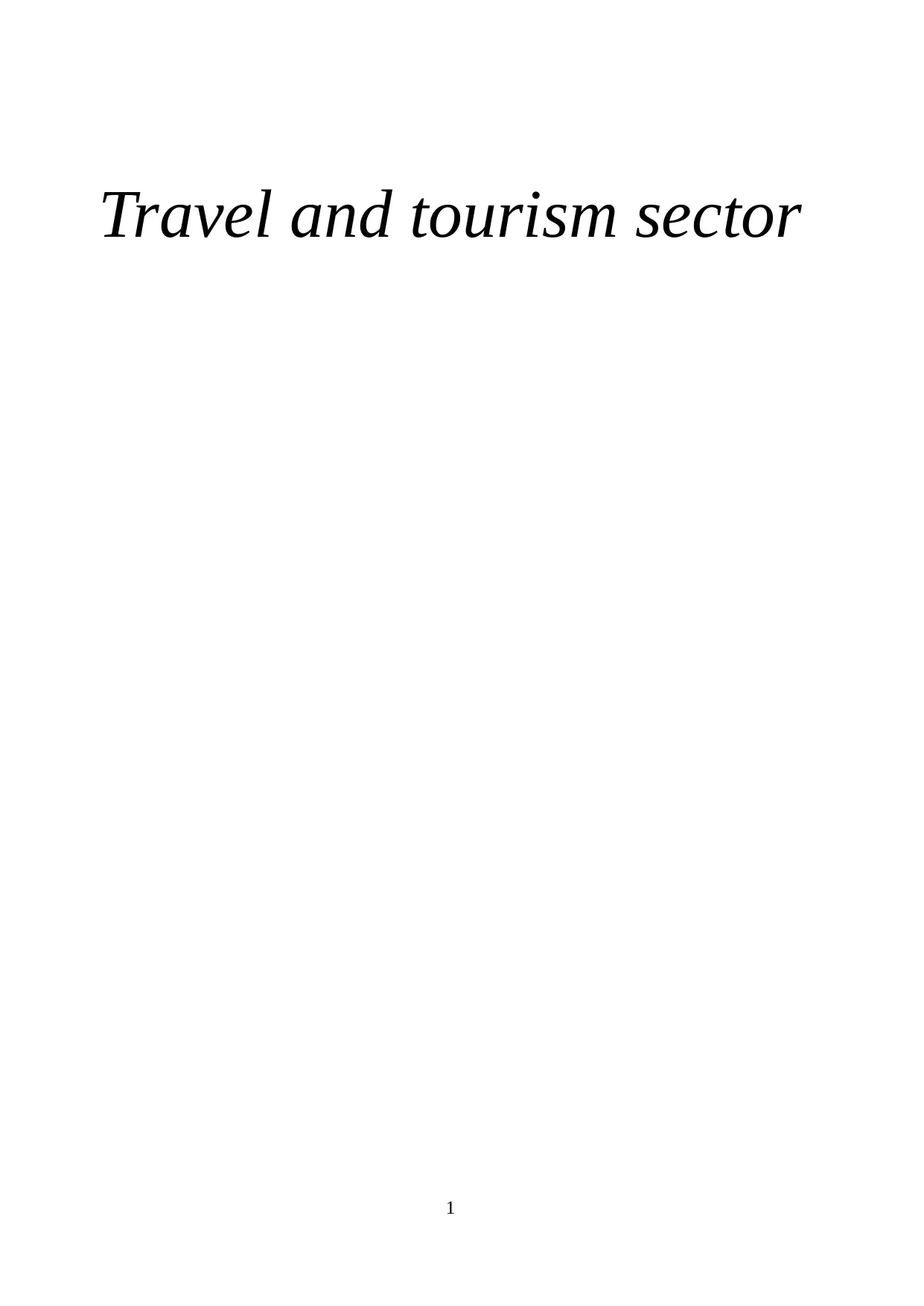
Travel and tourism sector
1
1
Paraphrase This Document
Need a fresh take? Get an instant paraphrase of this document with our AI Paraphraser
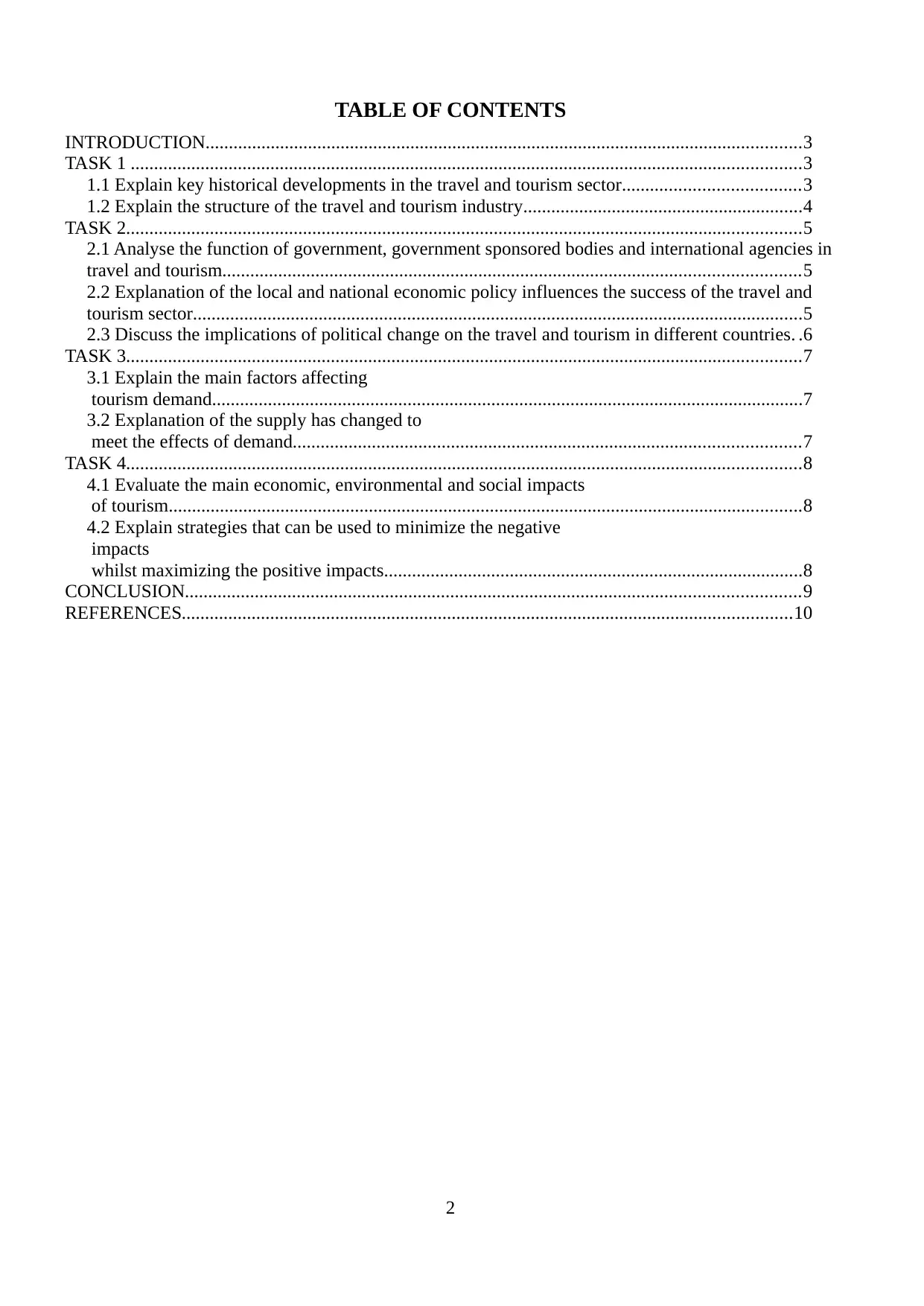
TABLE OF CONTENTS
INTRODUCTION................................................................................................................................3
TASK 1 ................................................................................................................................................3
1.1 Explain key historical developments in the travel and tourism sector......................................3
1.2 Explain the structure of the travel and tourism industry............................................................4
TASK 2.................................................................................................................................................5
2.1 Analyse the function of government, government sponsored bodies and international agencies in
travel and tourism............................................................................................................................5
2.2 Explanation of the local and national economic policy influences the success of the travel and
tourism sector...................................................................................................................................5
2.3 Discuss the implications of political change on the travel and tourism in different countries. .6
TASK 3.................................................................................................................................................7
3.1 Explain the main factors affecting
tourism demand...............................................................................................................................7
3.2 Explanation of the supply has changed to
meet the effects of demand.............................................................................................................7
TASK 4.................................................................................................................................................8
4.1 Evaluate the main economic, environmental and social impacts
of tourism........................................................................................................................................8
4.2 Explain strategies that can be used to minimize the negative
impacts
whilst maximizing the positive impacts..........................................................................................8
CONCLUSION....................................................................................................................................9
REFERENCES...................................................................................................................................10
2
INTRODUCTION................................................................................................................................3
TASK 1 ................................................................................................................................................3
1.1 Explain key historical developments in the travel and tourism sector......................................3
1.2 Explain the structure of the travel and tourism industry............................................................4
TASK 2.................................................................................................................................................5
2.1 Analyse the function of government, government sponsored bodies and international agencies in
travel and tourism............................................................................................................................5
2.2 Explanation of the local and national economic policy influences the success of the travel and
tourism sector...................................................................................................................................5
2.3 Discuss the implications of political change on the travel and tourism in different countries. .6
TASK 3.................................................................................................................................................7
3.1 Explain the main factors affecting
tourism demand...............................................................................................................................7
3.2 Explanation of the supply has changed to
meet the effects of demand.............................................................................................................7
TASK 4.................................................................................................................................................8
4.1 Evaluate the main economic, environmental and social impacts
of tourism........................................................................................................................................8
4.2 Explain strategies that can be used to minimize the negative
impacts
whilst maximizing the positive impacts..........................................................................................8
CONCLUSION....................................................................................................................................9
REFERENCES...................................................................................................................................10
2
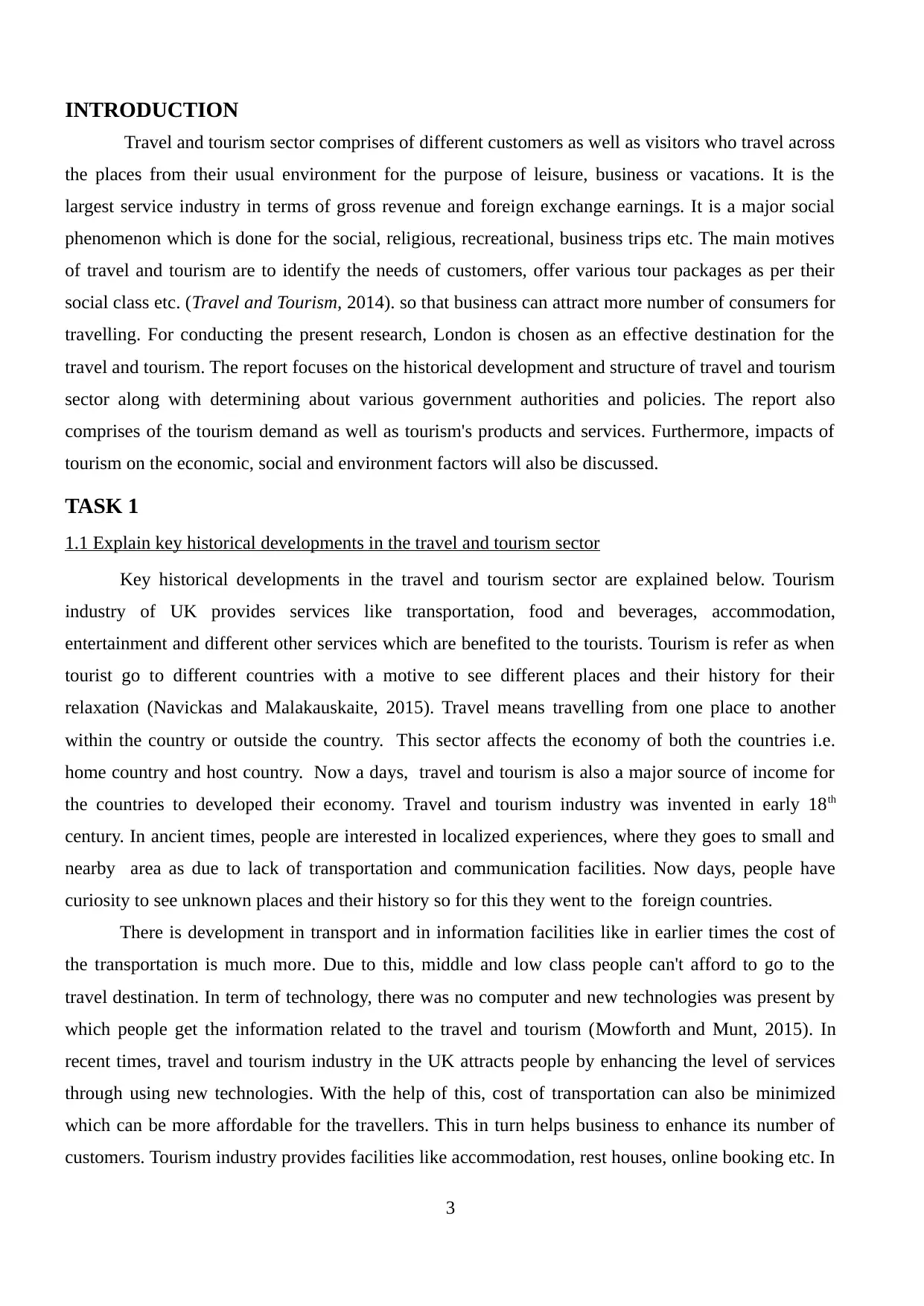
INTRODUCTION
Travel and tourism sector comprises of different customers as well as visitors who travel across
the places from their usual environment for the purpose of leisure, business or vacations. It is the
largest service industry in terms of gross revenue and foreign exchange earnings. It is a major social
phenomenon which is done for the social, religious, recreational, business trips etc. The main motives
of travel and tourism are to identify the needs of customers, offer various tour packages as per their
social class etc. (Travel and Tourism, 2014). so that business can attract more number of consumers for
travelling. For conducting the present research, London is chosen as an effective destination for the
travel and tourism. The report focuses on the historical development and structure of travel and tourism
sector along with determining about various government authorities and policies. The report also
comprises of the tourism demand as well as tourism's products and services. Furthermore, impacts of
tourism on the economic, social and environment factors will also be discussed.
TASK 1
1.1 Explain key historical developments in the travel and tourism sector
Key historical developments in the travel and tourism sector are explained below. Tourism
industry of UK provides services like transportation, food and beverages, accommodation,
entertainment and different other services which are benefited to the tourists. Tourism is refer as when
tourist go to different countries with a motive to see different places and their history for their
relaxation (Navickas and Malakauskaite, 2015). Travel means travelling from one place to another
within the country or outside the country. This sector affects the economy of both the countries i.e.
home country and host country. Now a days, travel and tourism is also a major source of income for
the countries to developed their economy. Travel and tourism industry was invented in early 18th
century. In ancient times, people are interested in localized experiences, where they goes to small and
nearby area as due to lack of transportation and communication facilities. Now days, people have
curiosity to see unknown places and their history so for this they went to the foreign countries.
There is development in transport and in information facilities like in earlier times the cost of
the transportation is much more. Due to this, middle and low class people can't afford to go to the
travel destination. In term of technology, there was no computer and new technologies was present by
which people get the information related to the travel and tourism (Mowforth and Munt, 2015). In
recent times, travel and tourism industry in the UK attracts people by enhancing the level of services
through using new technologies. With the help of this, cost of transportation can also be minimized
which can be more affordable for the travellers. This in turn helps business to enhance its number of
customers. Tourism industry provides facilities like accommodation, rest houses, online booking etc. In
3
Travel and tourism sector comprises of different customers as well as visitors who travel across
the places from their usual environment for the purpose of leisure, business or vacations. It is the
largest service industry in terms of gross revenue and foreign exchange earnings. It is a major social
phenomenon which is done for the social, religious, recreational, business trips etc. The main motives
of travel and tourism are to identify the needs of customers, offer various tour packages as per their
social class etc. (Travel and Tourism, 2014). so that business can attract more number of consumers for
travelling. For conducting the present research, London is chosen as an effective destination for the
travel and tourism. The report focuses on the historical development and structure of travel and tourism
sector along with determining about various government authorities and policies. The report also
comprises of the tourism demand as well as tourism's products and services. Furthermore, impacts of
tourism on the economic, social and environment factors will also be discussed.
TASK 1
1.1 Explain key historical developments in the travel and tourism sector
Key historical developments in the travel and tourism sector are explained below. Tourism
industry of UK provides services like transportation, food and beverages, accommodation,
entertainment and different other services which are benefited to the tourists. Tourism is refer as when
tourist go to different countries with a motive to see different places and their history for their
relaxation (Navickas and Malakauskaite, 2015). Travel means travelling from one place to another
within the country or outside the country. This sector affects the economy of both the countries i.e.
home country and host country. Now a days, travel and tourism is also a major source of income for
the countries to developed their economy. Travel and tourism industry was invented in early 18th
century. In ancient times, people are interested in localized experiences, where they goes to small and
nearby area as due to lack of transportation and communication facilities. Now days, people have
curiosity to see unknown places and their history so for this they went to the foreign countries.
There is development in transport and in information facilities like in earlier times the cost of
the transportation is much more. Due to this, middle and low class people can't afford to go to the
travel destination. In term of technology, there was no computer and new technologies was present by
which people get the information related to the travel and tourism (Mowforth and Munt, 2015). In
recent times, travel and tourism industry in the UK attracts people by enhancing the level of services
through using new technologies. With the help of this, cost of transportation can also be minimized
which can be more affordable for the travellers. This in turn helps business to enhance its number of
customers. Tourism industry provides facilities like accommodation, rest houses, online booking etc. In
3
⊘ This is a preview!⊘
Do you want full access?
Subscribe today to unlock all pages.

Trusted by 1+ million students worldwide
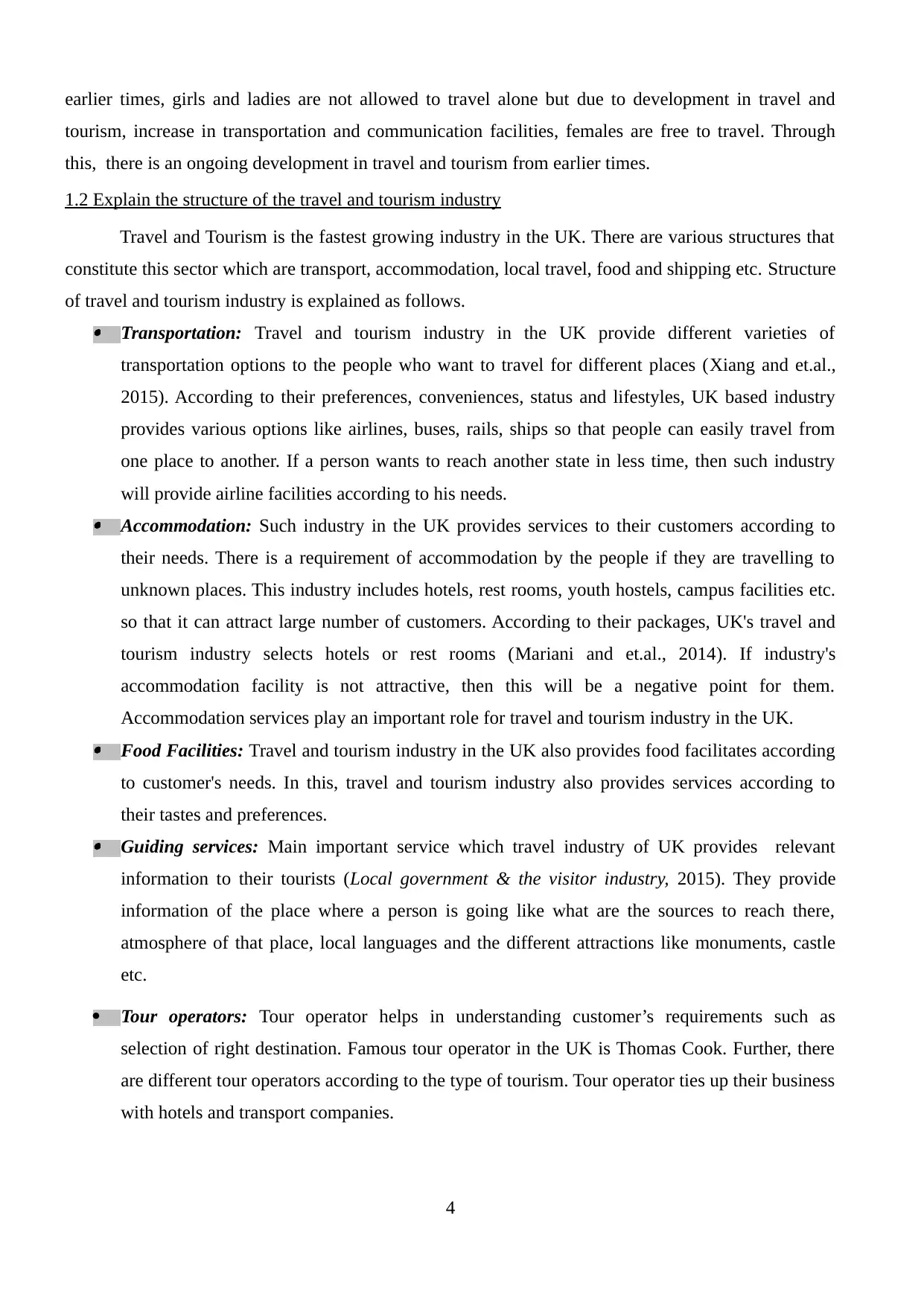
earlier times, girls and ladies are not allowed to travel alone but due to development in travel and
tourism, increase in transportation and communication facilities, females are free to travel. Through
this, there is an ongoing development in travel and tourism from earlier times.
1.2 Explain the structure of the travel and tourism industry
Travel and Tourism is the fastest growing industry in the UK. There are various structures that
constitute this sector which are transport, accommodation, local travel, food and shipping etc. Structure
of travel and tourism industry is explained as follows. Transportation: Travel and tourism industry in the UK provide different varieties of
transportation options to the people who want to travel for different places (Xiang and et.al.,
2015). According to their preferences, conveniences, status and lifestyles, UK based industry
provides various options like airlines, buses, rails, ships so that people can easily travel from
one place to another. If a person wants to reach another state in less time, then such industry
will provide airline facilities according to his needs. Accommodation: Such industry in the UK provides services to their customers according to
their needs. There is a requirement of accommodation by the people if they are travelling to
unknown places. This industry includes hotels, rest rooms, youth hostels, campus facilities etc.
so that it can attract large number of customers. According to their packages, UK's travel and
tourism industry selects hotels or rest rooms (Mariani and et.al., 2014). If industry's
accommodation facility is not attractive, then this will be a negative point for them.
Accommodation services play an important role for travel and tourism industry in the UK. Food Facilities: Travel and tourism industry in the UK also provides food facilitates according
to customer's needs. In this, travel and tourism industry also provides services according to
their tastes and preferences. Guiding services: Main important service which travel industry of UK provides relevant
information to their tourists (Local government & the visitor industry, 2015). They provide
information of the place where a person is going like what are the sources to reach there,
atmosphere of that place, local languages and the different attractions like monuments, castle
etc.
Tour operators: Tour operator helps in understanding customer’s requirements such as
selection of right destination. Famous tour operator in the UK is Thomas Cook. Further, there
are different tour operators according to the type of tourism. Tour operator ties up their business
with hotels and transport companies.
4
tourism, increase in transportation and communication facilities, females are free to travel. Through
this, there is an ongoing development in travel and tourism from earlier times.
1.2 Explain the structure of the travel and tourism industry
Travel and Tourism is the fastest growing industry in the UK. There are various structures that
constitute this sector which are transport, accommodation, local travel, food and shipping etc. Structure
of travel and tourism industry is explained as follows. Transportation: Travel and tourism industry in the UK provide different varieties of
transportation options to the people who want to travel for different places (Xiang and et.al.,
2015). According to their preferences, conveniences, status and lifestyles, UK based industry
provides various options like airlines, buses, rails, ships so that people can easily travel from
one place to another. If a person wants to reach another state in less time, then such industry
will provide airline facilities according to his needs. Accommodation: Such industry in the UK provides services to their customers according to
their needs. There is a requirement of accommodation by the people if they are travelling to
unknown places. This industry includes hotels, rest rooms, youth hostels, campus facilities etc.
so that it can attract large number of customers. According to their packages, UK's travel and
tourism industry selects hotels or rest rooms (Mariani and et.al., 2014). If industry's
accommodation facility is not attractive, then this will be a negative point for them.
Accommodation services play an important role for travel and tourism industry in the UK. Food Facilities: Travel and tourism industry in the UK also provides food facilitates according
to customer's needs. In this, travel and tourism industry also provides services according to
their tastes and preferences. Guiding services: Main important service which travel industry of UK provides relevant
information to their tourists (Local government & the visitor industry, 2015). They provide
information of the place where a person is going like what are the sources to reach there,
atmosphere of that place, local languages and the different attractions like monuments, castle
etc.
Tour operators: Tour operator helps in understanding customer’s requirements such as
selection of right destination. Famous tour operator in the UK is Thomas Cook. Further, there
are different tour operators according to the type of tourism. Tour operator ties up their business
with hotels and transport companies.
4
Paraphrase This Document
Need a fresh take? Get an instant paraphrase of this document with our AI Paraphraser
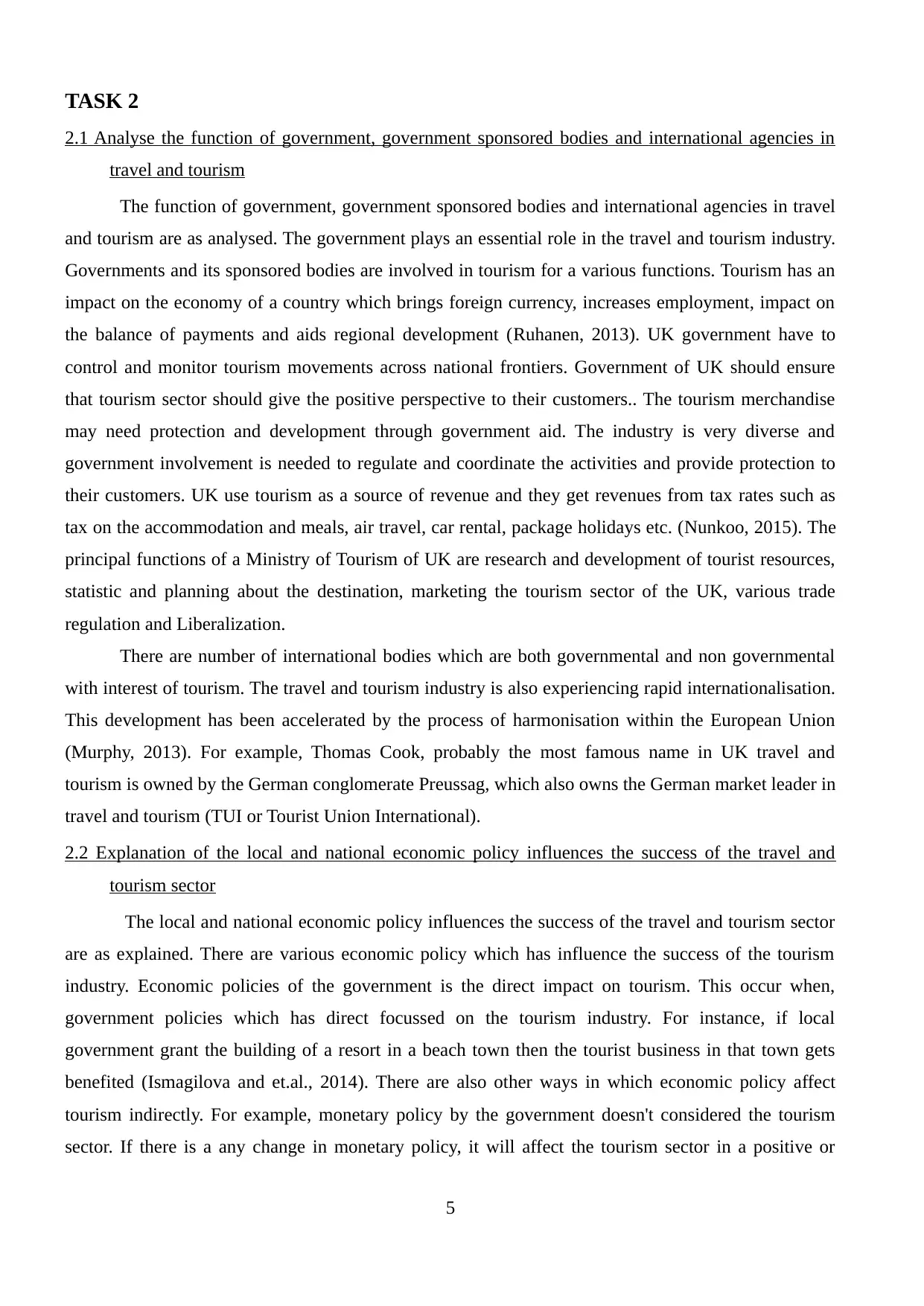
TASK 2
2.1 Analyse the function of government, government sponsored bodies and international agencies in
travel and tourism
The function of government, government sponsored bodies and international agencies in travel
and tourism are as analysed. The government plays an essential role in the travel and tourism industry.
Governments and its sponsored bodies are involved in tourism for a various functions. Tourism has an
impact on the economy of a country which brings foreign currency, increases employment, impact on
the balance of payments and aids regional development (Ruhanen, 2013). UK government have to
control and monitor tourism movements across national frontiers. Government of UK should ensure
that tourism sector should give the positive perspective to their customers.. The tourism merchandise
may need protection and development through government aid. The industry is very diverse and
government involvement is needed to regulate and coordinate the activities and provide protection to
their customers. UK use tourism as a source of revenue and they get revenues from tax rates such as
tax on the accommodation and meals, air travel, car rental, package holidays etc. (Nunkoo, 2015). The
principal functions of a Ministry of Tourism of UK are research and development of tourist resources,
statistic and planning about the destination, marketing the tourism sector of the UK, various trade
regulation and Liberalization.
There are number of international bodies which are both governmental and non governmental
with interest of tourism. The travel and tourism industry is also experiencing rapid internationalisation.
This development has been accelerated by the process of harmonisation within the European Union
(Murphy, 2013). For example, Thomas Cook, probably the most famous name in UK travel and
tourism is owned by the German conglomerate Preussag, which also owns the German market leader in
travel and tourism (TUI or Tourist Union International).
2.2 Explanation of the local and national economic policy influences the success of the travel and
tourism sector
The local and national economic policy influences the success of the travel and tourism sector
are as explained. There are various economic policy which has influence the success of the tourism
industry. Economic policies of the government is the direct impact on tourism. This occur when,
government policies which has direct focussed on the tourism industry. For instance, if local
government grant the building of a resort in a beach town then the tourist business in that town gets
benefited (Ismagilova and et.al., 2014). There are also other ways in which economic policy affect
tourism indirectly. For example, monetary policy by the government doesn't considered the tourism
sector. If there is a any change in monetary policy, it will affect the tourism sector in a positive or
5
2.1 Analyse the function of government, government sponsored bodies and international agencies in
travel and tourism
The function of government, government sponsored bodies and international agencies in travel
and tourism are as analysed. The government plays an essential role in the travel and tourism industry.
Governments and its sponsored bodies are involved in tourism for a various functions. Tourism has an
impact on the economy of a country which brings foreign currency, increases employment, impact on
the balance of payments and aids regional development (Ruhanen, 2013). UK government have to
control and monitor tourism movements across national frontiers. Government of UK should ensure
that tourism sector should give the positive perspective to their customers.. The tourism merchandise
may need protection and development through government aid. The industry is very diverse and
government involvement is needed to regulate and coordinate the activities and provide protection to
their customers. UK use tourism as a source of revenue and they get revenues from tax rates such as
tax on the accommodation and meals, air travel, car rental, package holidays etc. (Nunkoo, 2015). The
principal functions of a Ministry of Tourism of UK are research and development of tourist resources,
statistic and planning about the destination, marketing the tourism sector of the UK, various trade
regulation and Liberalization.
There are number of international bodies which are both governmental and non governmental
with interest of tourism. The travel and tourism industry is also experiencing rapid internationalisation.
This development has been accelerated by the process of harmonisation within the European Union
(Murphy, 2013). For example, Thomas Cook, probably the most famous name in UK travel and
tourism is owned by the German conglomerate Preussag, which also owns the German market leader in
travel and tourism (TUI or Tourist Union International).
2.2 Explanation of the local and national economic policy influences the success of the travel and
tourism sector
The local and national economic policy influences the success of the travel and tourism sector
are as explained. There are various economic policy which has influence the success of the tourism
industry. Economic policies of the government is the direct impact on tourism. This occur when,
government policies which has direct focussed on the tourism industry. For instance, if local
government grant the building of a resort in a beach town then the tourist business in that town gets
benefited (Ismagilova and et.al., 2014). There are also other ways in which economic policy affect
tourism indirectly. For example, monetary policy by the government doesn't considered the tourism
sector. If there is a any change in monetary policy, it will affect the tourism sector in a positive or
5
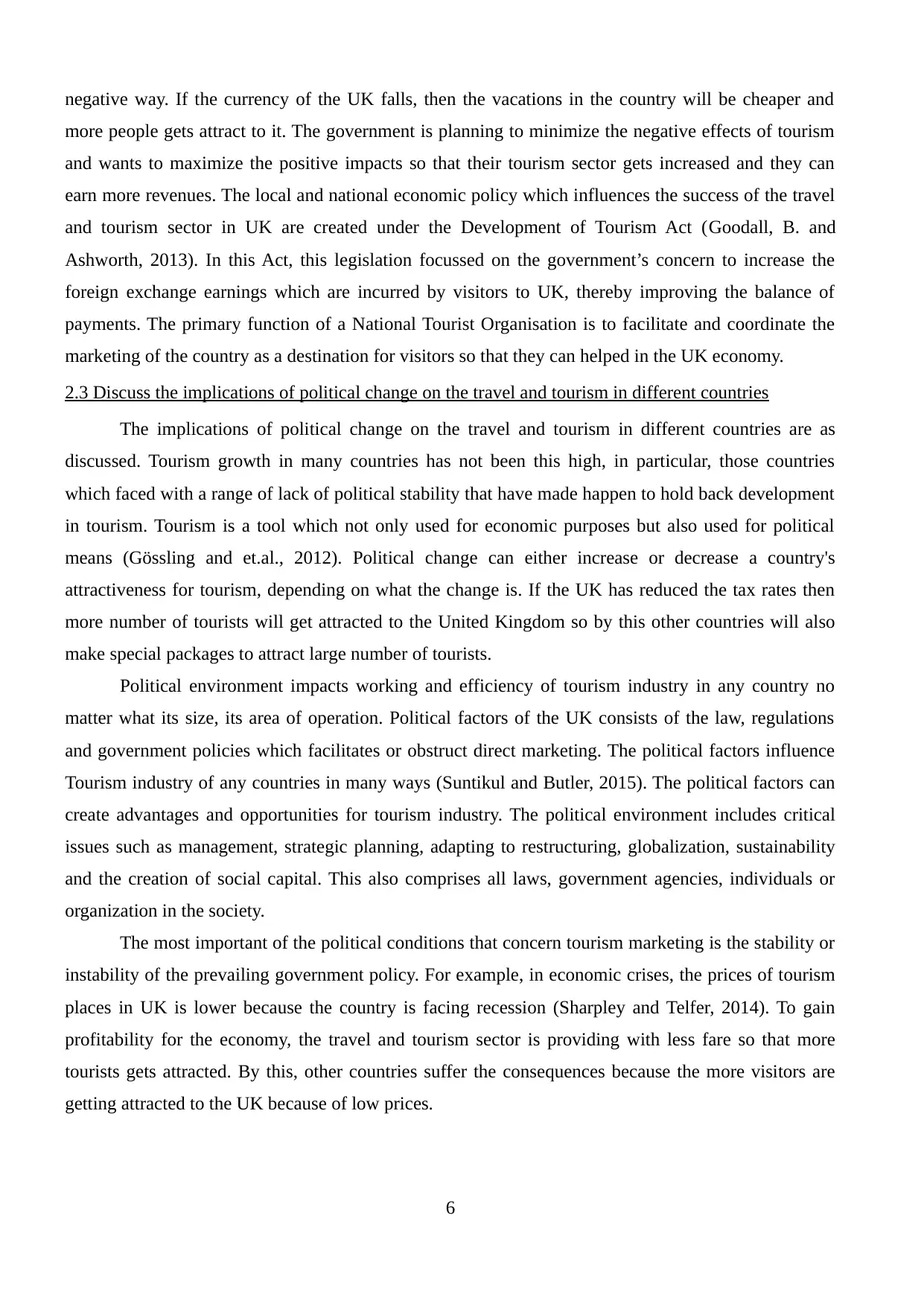
negative way. If the currency of the UK falls, then the vacations in the country will be cheaper and
more people gets attract to it. The government is planning to minimize the negative effects of tourism
and wants to maximize the positive impacts so that their tourism sector gets increased and they can
earn more revenues. The local and national economic policy which influences the success of the travel
and tourism sector in UK are created under the Development of Tourism Act (Goodall, B. and
Ashworth, 2013). In this Act, this legislation focussed on the government’s concern to increase the
foreign exchange earnings which are incurred by visitors to UK, thereby improving the balance of
payments. The primary function of a National Tourist Organisation is to facilitate and coordinate the
marketing of the country as a destination for visitors so that they can helped in the UK economy.
2.3 Discuss the implications of political change on the travel and tourism in different countries
The implications of political change on the travel and tourism in different countries are as
discussed. Tourism growth in many countries has not been this high, in particular, those countries
which faced with a range of lack of political stability that have made happen to hold back development
in tourism. Tourism is a tool which not only used for economic purposes but also used for political
means (Gössling and et.al., 2012). Political change can either increase or decrease a country's
attractiveness for tourism, depending on what the change is. If the UK has reduced the tax rates then
more number of tourists will get attracted to the United Kingdom so by this other countries will also
make special packages to attract large number of tourists.
Political environment impacts working and efficiency of tourism industry in any country no
matter what its size, its area of operation. Political factors of the UK consists of the law, regulations
and government policies which facilitates or obstruct direct marketing. The political factors influence
Tourism industry of any countries in many ways (Suntikul and Butler, 2015). The political factors can
create advantages and opportunities for tourism industry. The political environment includes critical
issues such as management, strategic planning, adapting to restructuring, globalization, sustainability
and the creation of social capital. This also comprises all laws, government agencies, individuals or
organization in the society.
The most important of the political conditions that concern tourism marketing is the stability or
instability of the prevailing government policy. For example, in economic crises, the prices of tourism
places in UK is lower because the country is facing recession (Sharpley and Telfer, 2014). To gain
profitability for the economy, the travel and tourism sector is providing with less fare so that more
tourists gets attracted. By this, other countries suffer the consequences because the more visitors are
getting attracted to the UK because of low prices.
6
more people gets attract to it. The government is planning to minimize the negative effects of tourism
and wants to maximize the positive impacts so that their tourism sector gets increased and they can
earn more revenues. The local and national economic policy which influences the success of the travel
and tourism sector in UK are created under the Development of Tourism Act (Goodall, B. and
Ashworth, 2013). In this Act, this legislation focussed on the government’s concern to increase the
foreign exchange earnings which are incurred by visitors to UK, thereby improving the balance of
payments. The primary function of a National Tourist Organisation is to facilitate and coordinate the
marketing of the country as a destination for visitors so that they can helped in the UK economy.
2.3 Discuss the implications of political change on the travel and tourism in different countries
The implications of political change on the travel and tourism in different countries are as
discussed. Tourism growth in many countries has not been this high, in particular, those countries
which faced with a range of lack of political stability that have made happen to hold back development
in tourism. Tourism is a tool which not only used for economic purposes but also used for political
means (Gössling and et.al., 2012). Political change can either increase or decrease a country's
attractiveness for tourism, depending on what the change is. If the UK has reduced the tax rates then
more number of tourists will get attracted to the United Kingdom so by this other countries will also
make special packages to attract large number of tourists.
Political environment impacts working and efficiency of tourism industry in any country no
matter what its size, its area of operation. Political factors of the UK consists of the law, regulations
and government policies which facilitates or obstruct direct marketing. The political factors influence
Tourism industry of any countries in many ways (Suntikul and Butler, 2015). The political factors can
create advantages and opportunities for tourism industry. The political environment includes critical
issues such as management, strategic planning, adapting to restructuring, globalization, sustainability
and the creation of social capital. This also comprises all laws, government agencies, individuals or
organization in the society.
The most important of the political conditions that concern tourism marketing is the stability or
instability of the prevailing government policy. For example, in economic crises, the prices of tourism
places in UK is lower because the country is facing recession (Sharpley and Telfer, 2014). To gain
profitability for the economy, the travel and tourism sector is providing with less fare so that more
tourists gets attracted. By this, other countries suffer the consequences because the more visitors are
getting attracted to the UK because of low prices.
6
⊘ This is a preview!⊘
Do you want full access?
Subscribe today to unlock all pages.

Trusted by 1+ million students worldwide
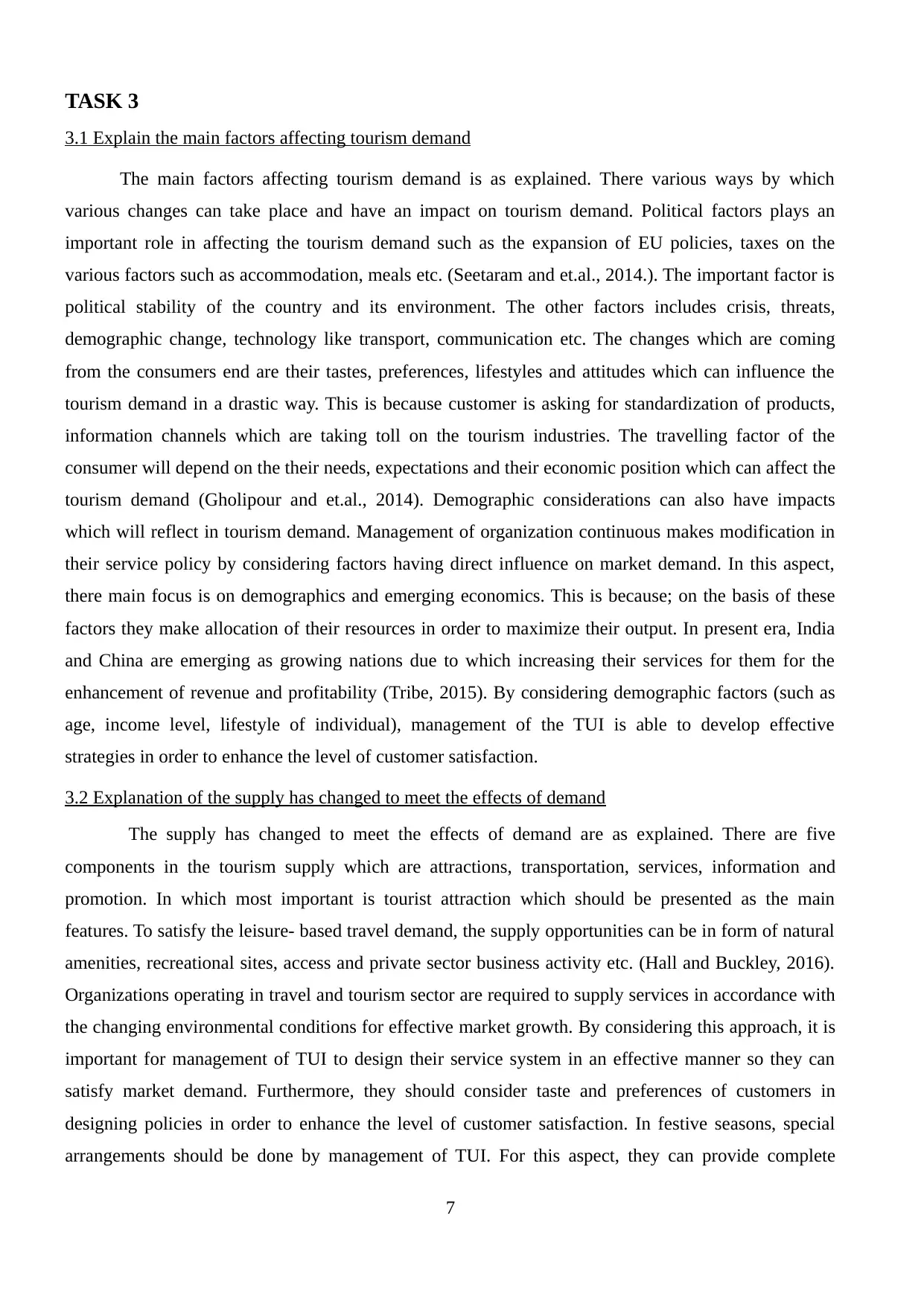
TASK 3
3.1 Explain the main factors affecting tourism demand
The main factors affecting tourism demand is as explained. There various ways by which
various changes can take place and have an impact on tourism demand. Political factors plays an
important role in affecting the tourism demand such as the expansion of EU policies, taxes on the
various factors such as accommodation, meals etc. (Seetaram and et.al., 2014.). The important factor is
political stability of the country and its environment. The other factors includes crisis, threats,
demographic change, technology like transport, communication etc. The changes which are coming
from the consumers end are their tastes, preferences, lifestyles and attitudes which can influence the
tourism demand in a drastic way. This is because customer is asking for standardization of products,
information channels which are taking toll on the tourism industries. The travelling factor of the
consumer will depend on the their needs, expectations and their economic position which can affect the
tourism demand (Gholipour and et.al., 2014). Demographic considerations can also have impacts
which will reflect in tourism demand. Management of organization continuous makes modification in
their service policy by considering factors having direct influence on market demand. In this aspect,
there main focus is on demographics and emerging economics. This is because; on the basis of these
factors they make allocation of their resources in order to maximize their output. In present era, India
and China are emerging as growing nations due to which increasing their services for them for the
enhancement of revenue and profitability (Tribe, 2015). By considering demographic factors (such as
age, income level, lifestyle of individual), management of the TUI is able to develop effective
strategies in order to enhance the level of customer satisfaction.
3.2 Explanation of the supply has changed to meet the effects of demand
The supply has changed to meet the effects of demand are as explained. There are five
components in the tourism supply which are attractions, transportation, services, information and
promotion. In which most important is tourist attraction which should be presented as the main
features. To satisfy the leisure- based travel demand, the supply opportunities can be in form of natural
amenities, recreational sites, access and private sector business activity etc. (Hall and Buckley, 2016).
Organizations operating in travel and tourism sector are required to supply services in accordance with
the changing environmental conditions for effective market growth. By considering this approach, it is
important for management of TUI to design their service system in an effective manner so they can
satisfy market demand. Furthermore, they should consider taste and preferences of customers in
designing policies in order to enhance the level of customer satisfaction. In festive seasons, special
arrangements should be done by management of TUI. For this aspect, they can provide complete
7
3.1 Explain the main factors affecting tourism demand
The main factors affecting tourism demand is as explained. There various ways by which
various changes can take place and have an impact on tourism demand. Political factors plays an
important role in affecting the tourism demand such as the expansion of EU policies, taxes on the
various factors such as accommodation, meals etc. (Seetaram and et.al., 2014.). The important factor is
political stability of the country and its environment. The other factors includes crisis, threats,
demographic change, technology like transport, communication etc. The changes which are coming
from the consumers end are their tastes, preferences, lifestyles and attitudes which can influence the
tourism demand in a drastic way. This is because customer is asking for standardization of products,
information channels which are taking toll on the tourism industries. The travelling factor of the
consumer will depend on the their needs, expectations and their economic position which can affect the
tourism demand (Gholipour and et.al., 2014). Demographic considerations can also have impacts
which will reflect in tourism demand. Management of organization continuous makes modification in
their service policy by considering factors having direct influence on market demand. In this aspect,
there main focus is on demographics and emerging economics. This is because; on the basis of these
factors they make allocation of their resources in order to maximize their output. In present era, India
and China are emerging as growing nations due to which increasing their services for them for the
enhancement of revenue and profitability (Tribe, 2015). By considering demographic factors (such as
age, income level, lifestyle of individual), management of the TUI is able to develop effective
strategies in order to enhance the level of customer satisfaction.
3.2 Explanation of the supply has changed to meet the effects of demand
The supply has changed to meet the effects of demand are as explained. There are five
components in the tourism supply which are attractions, transportation, services, information and
promotion. In which most important is tourist attraction which should be presented as the main
features. To satisfy the leisure- based travel demand, the supply opportunities can be in form of natural
amenities, recreational sites, access and private sector business activity etc. (Hall and Buckley, 2016).
Organizations operating in travel and tourism sector are required to supply services in accordance with
the changing environmental conditions for effective market growth. By considering this approach, it is
important for management of TUI to design their service system in an effective manner so they can
satisfy market demand. Furthermore, they should consider taste and preferences of customers in
designing policies in order to enhance the level of customer satisfaction. In festive seasons, special
arrangements should be done by management of TUI. For this aspect, they can provide complete
7
Paraphrase This Document
Need a fresh take? Get an instant paraphrase of this document with our AI Paraphraser
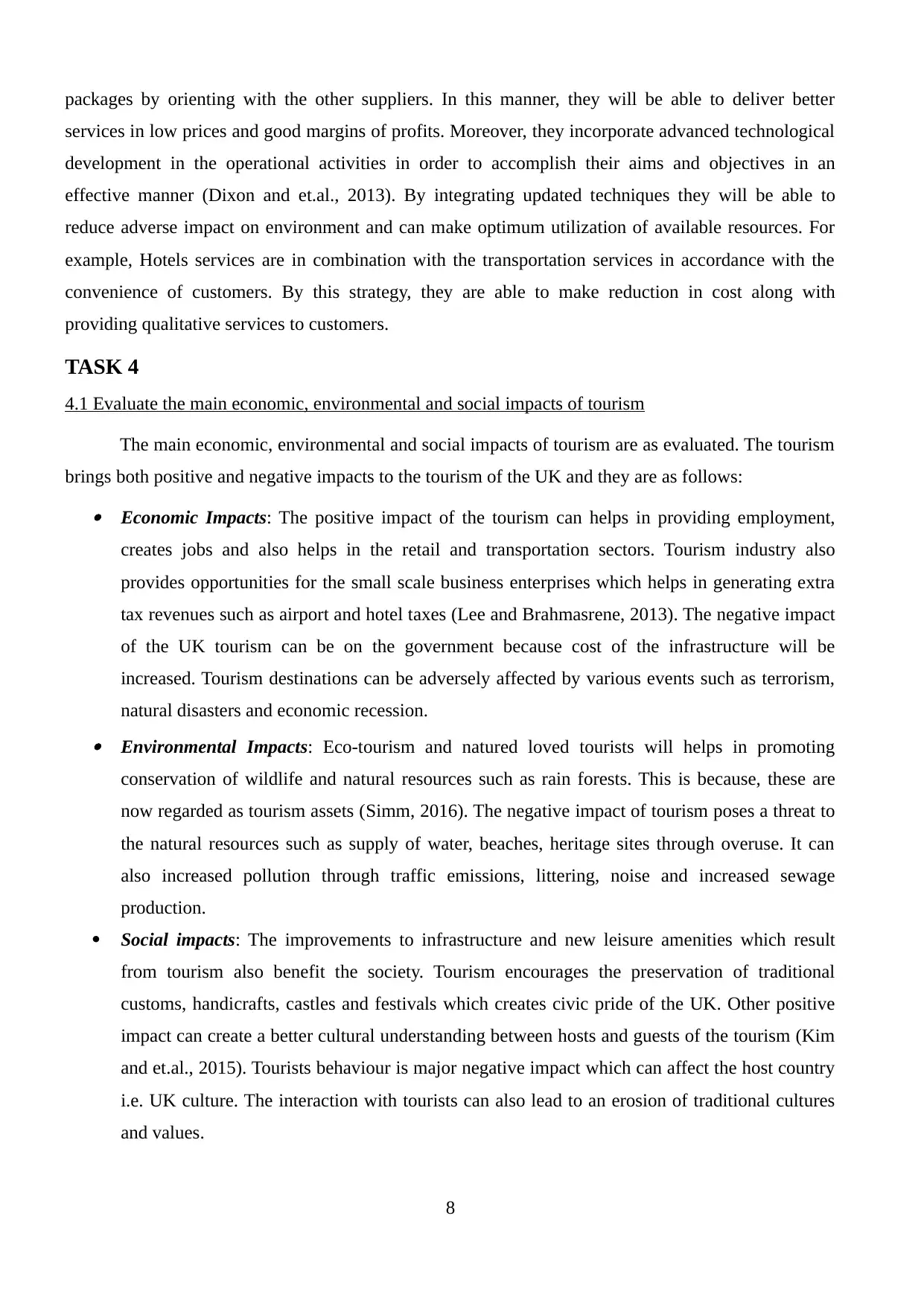
packages by orienting with the other suppliers. In this manner, they will be able to deliver better
services in low prices and good margins of profits. Moreover, they incorporate advanced technological
development in the operational activities in order to accomplish their aims and objectives in an
effective manner (Dixon and et.al., 2013). By integrating updated techniques they will be able to
reduce adverse impact on environment and can make optimum utilization of available resources. For
example, Hotels services are in combination with the transportation services in accordance with the
convenience of customers. By this strategy, they are able to make reduction in cost along with
providing qualitative services to customers.
TASK 4
4.1 Evaluate the main economic, environmental and social impacts of tourism
The main economic, environmental and social impacts of tourism are as evaluated. The tourism
brings both positive and negative impacts to the tourism of the UK and they are as follows:
Economic Impacts: The positive impact of the tourism can helps in providing employment,
creates jobs and also helps in the retail and transportation sectors. Tourism industry also
provides opportunities for the small scale business enterprises which helps in generating extra
tax revenues such as airport and hotel taxes (Lee and Brahmasrene, 2013). The negative impact
of the UK tourism can be on the government because cost of the infrastructure will be
increased. Tourism destinations can be adversely affected by various events such as terrorism,
natural disasters and economic recession.
Environmental Impacts: Eco-tourism and natured loved tourists will helps in promoting
conservation of wildlife and natural resources such as rain forests. This is because, these are
now regarded as tourism assets (Simm, 2016). The negative impact of tourism poses a threat to
the natural resources such as supply of water, beaches, heritage sites through overuse. It can
also increased pollution through traffic emissions, littering, noise and increased sewage
production.
Social impacts: The improvements to infrastructure and new leisure amenities which result
from tourism also benefit the society. Tourism encourages the preservation of traditional
customs, handicrafts, castles and festivals which creates civic pride of the UK. Other positive
impact can create a better cultural understanding between hosts and guests of the tourism (Kim
and et.al., 2015). Tourists behaviour is major negative impact which can affect the host country
i.e. UK culture. The interaction with tourists can also lead to an erosion of traditional cultures
and values.
8
services in low prices and good margins of profits. Moreover, they incorporate advanced technological
development in the operational activities in order to accomplish their aims and objectives in an
effective manner (Dixon and et.al., 2013). By integrating updated techniques they will be able to
reduce adverse impact on environment and can make optimum utilization of available resources. For
example, Hotels services are in combination with the transportation services in accordance with the
convenience of customers. By this strategy, they are able to make reduction in cost along with
providing qualitative services to customers.
TASK 4
4.1 Evaluate the main economic, environmental and social impacts of tourism
The main economic, environmental and social impacts of tourism are as evaluated. The tourism
brings both positive and negative impacts to the tourism of the UK and they are as follows:
Economic Impacts: The positive impact of the tourism can helps in providing employment,
creates jobs and also helps in the retail and transportation sectors. Tourism industry also
provides opportunities for the small scale business enterprises which helps in generating extra
tax revenues such as airport and hotel taxes (Lee and Brahmasrene, 2013). The negative impact
of the UK tourism can be on the government because cost of the infrastructure will be
increased. Tourism destinations can be adversely affected by various events such as terrorism,
natural disasters and economic recession.
Environmental Impacts: Eco-tourism and natured loved tourists will helps in promoting
conservation of wildlife and natural resources such as rain forests. This is because, these are
now regarded as tourism assets (Simm, 2016). The negative impact of tourism poses a threat to
the natural resources such as supply of water, beaches, heritage sites through overuse. It can
also increased pollution through traffic emissions, littering, noise and increased sewage
production.
Social impacts: The improvements to infrastructure and new leisure amenities which result
from tourism also benefit the society. Tourism encourages the preservation of traditional
customs, handicrafts, castles and festivals which creates civic pride of the UK. Other positive
impact can create a better cultural understanding between hosts and guests of the tourism (Kim
and et.al., 2015). Tourists behaviour is major negative impact which can affect the host country
i.e. UK culture. The interaction with tourists can also lead to an erosion of traditional cultures
and values.
8
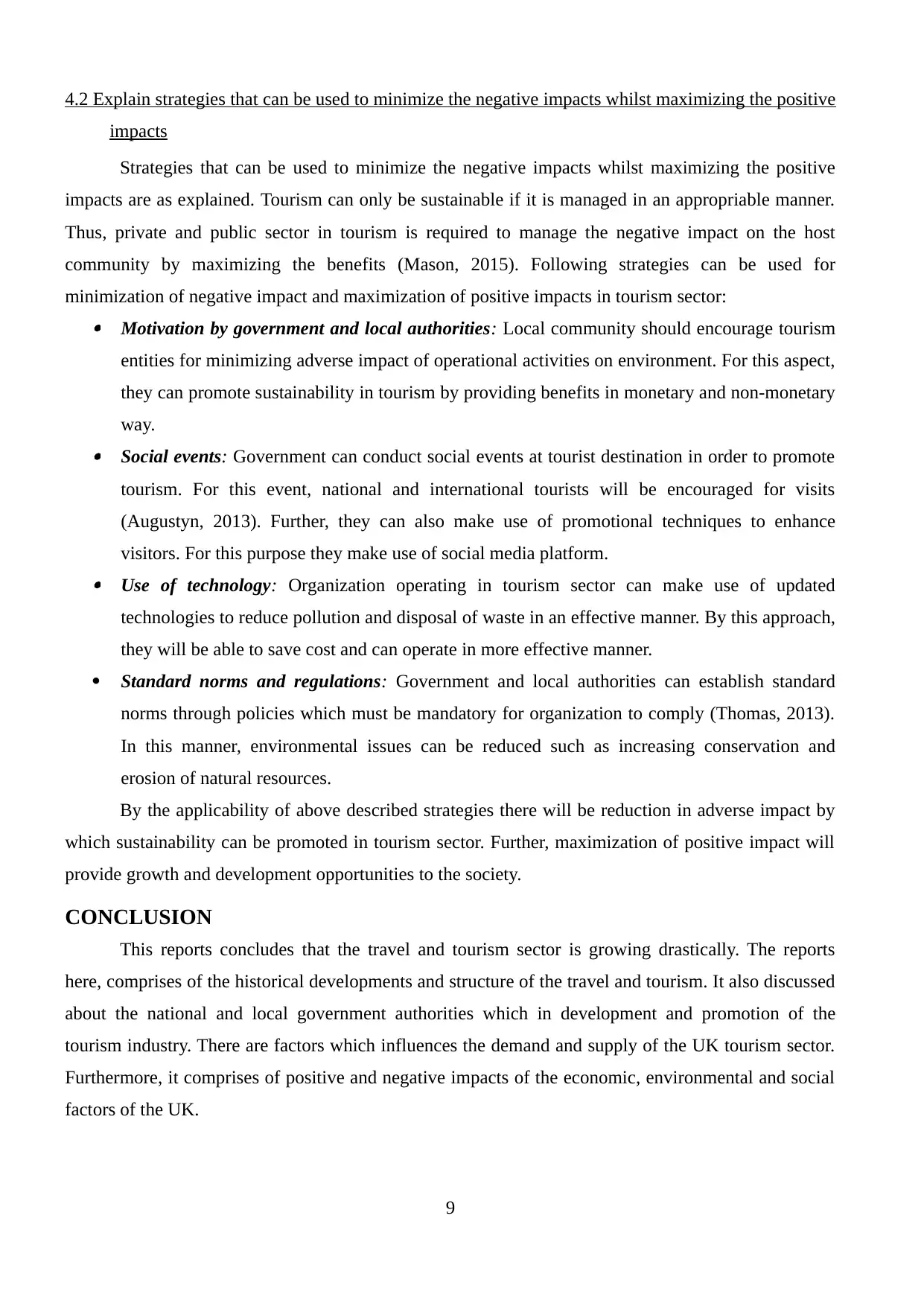
4.2 Explain strategies that can be used to minimize the negative impacts whilst maximizing the positive
impacts
Strategies that can be used to minimize the negative impacts whilst maximizing the positive
impacts are as explained. Tourism can only be sustainable if it is managed in an appropriable manner.
Thus, private and public sector in tourism is required to manage the negative impact on the host
community by maximizing the benefits (Mason, 2015). Following strategies can be used for
minimization of negative impact and maximization of positive impacts in tourism sector: Motivation by government and local authorities: Local community should encourage tourism
entities for minimizing adverse impact of operational activities on environment. For this aspect,
they can promote sustainability in tourism by providing benefits in monetary and non-monetary
way. Social events: Government can conduct social events at tourist destination in order to promote
tourism. For this event, national and international tourists will be encouraged for visits
(Augustyn, 2013). Further, they can also make use of promotional techniques to enhance
visitors. For this purpose they make use of social media platform. Use of technology: Organization operating in tourism sector can make use of updated
technologies to reduce pollution and disposal of waste in an effective manner. By this approach,
they will be able to save cost and can operate in more effective manner.
Standard norms and regulations: Government and local authorities can establish standard
norms through policies which must be mandatory for organization to comply (Thomas, 2013).
In this manner, environmental issues can be reduced such as increasing conservation and
erosion of natural resources.
By the applicability of above described strategies there will be reduction in adverse impact by
which sustainability can be promoted in tourism sector. Further, maximization of positive impact will
provide growth and development opportunities to the society.
CONCLUSION
This reports concludes that the travel and tourism sector is growing drastically. The reports
here, comprises of the historical developments and structure of the travel and tourism. It also discussed
about the national and local government authorities which in development and promotion of the
tourism industry. There are factors which influences the demand and supply of the UK tourism sector.
Furthermore, it comprises of positive and negative impacts of the economic, environmental and social
factors of the UK.
9
impacts
Strategies that can be used to minimize the negative impacts whilst maximizing the positive
impacts are as explained. Tourism can only be sustainable if it is managed in an appropriable manner.
Thus, private and public sector in tourism is required to manage the negative impact on the host
community by maximizing the benefits (Mason, 2015). Following strategies can be used for
minimization of negative impact and maximization of positive impacts in tourism sector: Motivation by government and local authorities: Local community should encourage tourism
entities for minimizing adverse impact of operational activities on environment. For this aspect,
they can promote sustainability in tourism by providing benefits in monetary and non-monetary
way. Social events: Government can conduct social events at tourist destination in order to promote
tourism. For this event, national and international tourists will be encouraged for visits
(Augustyn, 2013). Further, they can also make use of promotional techniques to enhance
visitors. For this purpose they make use of social media platform. Use of technology: Organization operating in tourism sector can make use of updated
technologies to reduce pollution and disposal of waste in an effective manner. By this approach,
they will be able to save cost and can operate in more effective manner.
Standard norms and regulations: Government and local authorities can establish standard
norms through policies which must be mandatory for organization to comply (Thomas, 2013).
In this manner, environmental issues can be reduced such as increasing conservation and
erosion of natural resources.
By the applicability of above described strategies there will be reduction in adverse impact by
which sustainability can be promoted in tourism sector. Further, maximization of positive impact will
provide growth and development opportunities to the society.
CONCLUSION
This reports concludes that the travel and tourism sector is growing drastically. The reports
here, comprises of the historical developments and structure of the travel and tourism. It also discussed
about the national and local government authorities which in development and promotion of the
tourism industry. There are factors which influences the demand and supply of the UK tourism sector.
Furthermore, it comprises of positive and negative impacts of the economic, environmental and social
factors of the UK.
9
⊘ This is a preview!⊘
Do you want full access?
Subscribe today to unlock all pages.

Trusted by 1+ million students worldwide
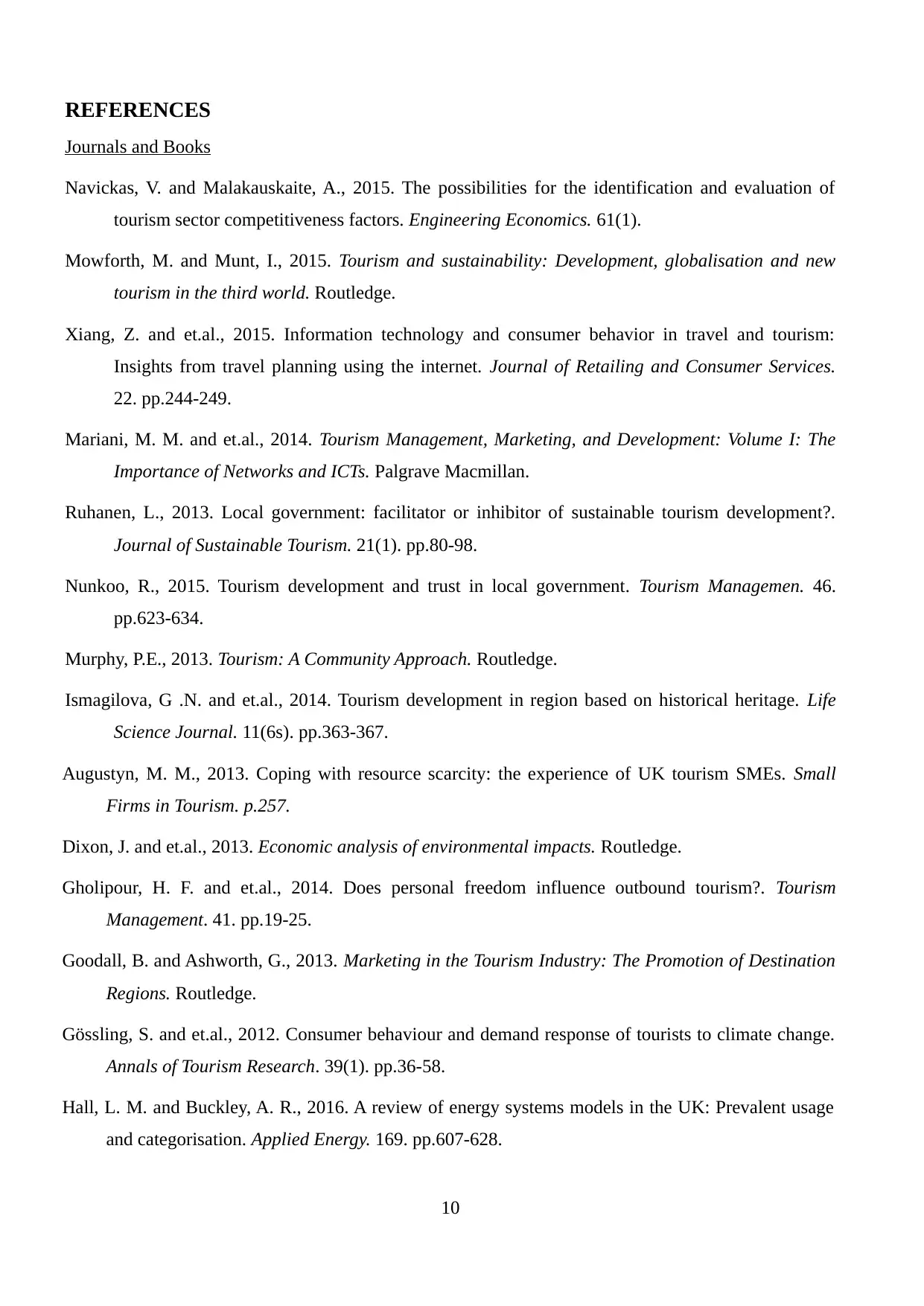
REFERENCES
Journals and Books
Navickas, V. and Malakauskaite, A., 2015. The possibilities for the identification and evaluation of
tourism sector competitiveness factors. Engineering Economics. 61(1).
Mowforth, M. and Munt, I., 2015. Tourism and sustainability: Development, globalisation and new
tourism in the third world. Routledge.
Xiang, Z. and et.al., 2015. Information technology and consumer behavior in travel and tourism:
Insights from travel planning using the internet. Journal of Retailing and Consumer Services.
22. pp.244-249.
Mariani, M. M. and et.al., 2014. Tourism Management, Marketing, and Development: Volume I: The
Importance of Networks and ICTs. Palgrave Macmillan.
Ruhanen, L., 2013. Local government: facilitator or inhibitor of sustainable tourism development?.
Journal of Sustainable Tourism. 21(1). pp.80-98.
Nunkoo, R., 2015. Tourism development and trust in local government. Tourism Managemen. 46.
pp.623-634.
Murphy, P.E., 2013. Tourism: A Community Approach. Routledge.
Ismagilova, G .N. and et.al., 2014. Tourism development in region based on historical heritage. Life
Science Journal. 11(6s). pp.363-367.
Augustyn, M. M., 2013. Coping with resource scarcity: the experience of UK tourism SMEs. Small
Firms in Tourism. p.257.
Dixon, J. and et.al., 2013. Economic analysis of environmental impacts. Routledge.
Gholipour, H. F. and et.al., 2014. Does personal freedom influence outbound tourism?. Tourism
Management. 41. pp.19-25.
Goodall, B. and Ashworth, G., 2013. Marketing in the Tourism Industry: The Promotion of Destination
Regions. Routledge.
Gössling, S. and et.al., 2012. Consumer behaviour and demand response of tourists to climate change.
Annals of Tourism Research. 39(1). pp.36-58.
Hall, L. M. and Buckley, A. R., 2016. A review of energy systems models in the UK: Prevalent usage
and categorisation. Applied Energy. 169. pp.607-628.
10
Journals and Books
Navickas, V. and Malakauskaite, A., 2015. The possibilities for the identification and evaluation of
tourism sector competitiveness factors. Engineering Economics. 61(1).
Mowforth, M. and Munt, I., 2015. Tourism and sustainability: Development, globalisation and new
tourism in the third world. Routledge.
Xiang, Z. and et.al., 2015. Information technology and consumer behavior in travel and tourism:
Insights from travel planning using the internet. Journal of Retailing and Consumer Services.
22. pp.244-249.
Mariani, M. M. and et.al., 2014. Tourism Management, Marketing, and Development: Volume I: The
Importance of Networks and ICTs. Palgrave Macmillan.
Ruhanen, L., 2013. Local government: facilitator or inhibitor of sustainable tourism development?.
Journal of Sustainable Tourism. 21(1). pp.80-98.
Nunkoo, R., 2015. Tourism development and trust in local government. Tourism Managemen. 46.
pp.623-634.
Murphy, P.E., 2013. Tourism: A Community Approach. Routledge.
Ismagilova, G .N. and et.al., 2014. Tourism development in region based on historical heritage. Life
Science Journal. 11(6s). pp.363-367.
Augustyn, M. M., 2013. Coping with resource scarcity: the experience of UK tourism SMEs. Small
Firms in Tourism. p.257.
Dixon, J. and et.al., 2013. Economic analysis of environmental impacts. Routledge.
Gholipour, H. F. and et.al., 2014. Does personal freedom influence outbound tourism?. Tourism
Management. 41. pp.19-25.
Goodall, B. and Ashworth, G., 2013. Marketing in the Tourism Industry: The Promotion of Destination
Regions. Routledge.
Gössling, S. and et.al., 2012. Consumer behaviour and demand response of tourists to climate change.
Annals of Tourism Research. 39(1). pp.36-58.
Hall, L. M. and Buckley, A. R., 2016. A review of energy systems models in the UK: Prevalent usage
and categorisation. Applied Energy. 169. pp.607-628.
10
Paraphrase This Document
Need a fresh take? Get an instant paraphrase of this document with our AI Paraphraser
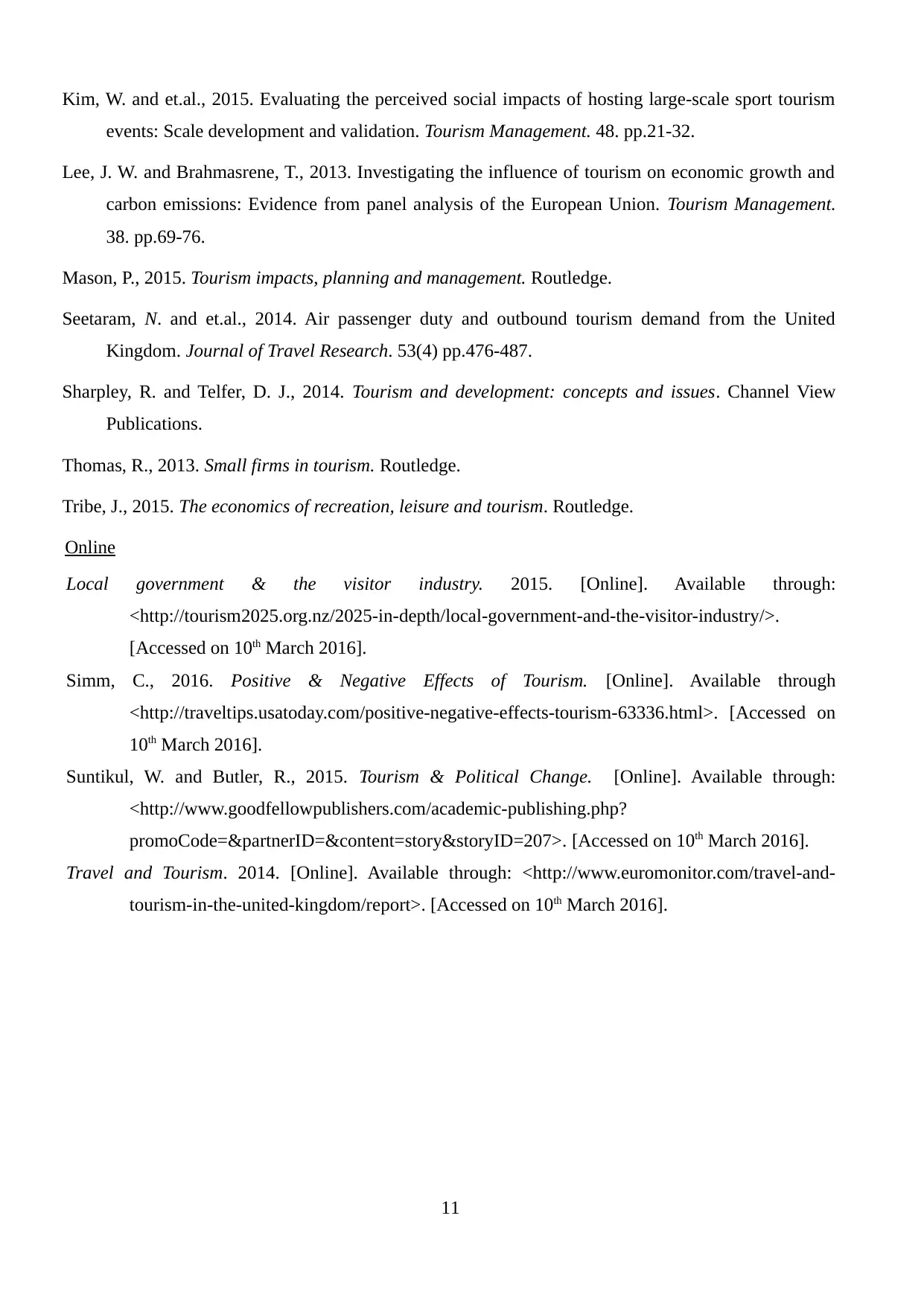
Kim, W. and et.al., 2015. Evaluating the perceived social impacts of hosting large-scale sport tourism
events: Scale development and validation. Tourism Management. 48. pp.21-32.
Lee, J. W. and Brahmasrene, T., 2013. Investigating the influence of tourism on economic growth and
carbon emissions: Evidence from panel analysis of the European Union. Tourism Management.
38. pp.69-76.
Mason, P., 2015. Tourism impacts, planning and management. Routledge.
Seetaram, N. and et.al., 2014. Air passenger duty and outbound tourism demand from the United
Kingdom. Journal of Travel Research. 53(4) pp.476-487.
Sharpley, R. and Telfer, D. J., 2014. Tourism and development: concepts and issues. Channel View
Publications.
Thomas, R., 2013. Small firms in tourism. Routledge.
Tribe, J., 2015. The economics of recreation, leisure and tourism. Routledge.
Online
Local government & the visitor industry. 2015. [Online]. Available through:
<http://tourism2025.org.nz/2025-in-depth/local-government-and-the-visitor-industry/>.
[Accessed on 10th March 2016].
Simm, C., 2016. Positive & Negative Effects of Tourism. [Online]. Available through
<http://traveltips.usatoday.com/positive-negative-effects-tourism-63336.html>. [Accessed on
10th March 2016].
Suntikul, W. and Butler, R., 2015. Tourism & Political Change. [Online]. Available through:
<http://www.goodfellowpublishers.com/academic-publishing.php?
promoCode=&partnerID=&content=story&storyID=207>. [Accessed on 10th March 2016].
Travel and Tourism. 2014. [Online]. Available through: <http://www.euromonitor.com/travel-and-
tourism-in-the-united-kingdom/report>. [Accessed on 10th March 2016].
11
events: Scale development and validation. Tourism Management. 48. pp.21-32.
Lee, J. W. and Brahmasrene, T., 2013. Investigating the influence of tourism on economic growth and
carbon emissions: Evidence from panel analysis of the European Union. Tourism Management.
38. pp.69-76.
Mason, P., 2015. Tourism impacts, planning and management. Routledge.
Seetaram, N. and et.al., 2014. Air passenger duty and outbound tourism demand from the United
Kingdom. Journal of Travel Research. 53(4) pp.476-487.
Sharpley, R. and Telfer, D. J., 2014. Tourism and development: concepts and issues. Channel View
Publications.
Thomas, R., 2013. Small firms in tourism. Routledge.
Tribe, J., 2015. The economics of recreation, leisure and tourism. Routledge.
Online
Local government & the visitor industry. 2015. [Online]. Available through:
<http://tourism2025.org.nz/2025-in-depth/local-government-and-the-visitor-industry/>.
[Accessed on 10th March 2016].
Simm, C., 2016. Positive & Negative Effects of Tourism. [Online]. Available through
<http://traveltips.usatoday.com/positive-negative-effects-tourism-63336.html>. [Accessed on
10th March 2016].
Suntikul, W. and Butler, R., 2015. Tourism & Political Change. [Online]. Available through:
<http://www.goodfellowpublishers.com/academic-publishing.php?
promoCode=&partnerID=&content=story&storyID=207>. [Accessed on 10th March 2016].
Travel and Tourism. 2014. [Online]. Available through: <http://www.euromonitor.com/travel-and-
tourism-in-the-united-kingdom/report>. [Accessed on 10th March 2016].
11

Page | 12
⊘ This is a preview!⊘
Do you want full access?
Subscribe today to unlock all pages.

Trusted by 1+ million students worldwide
1 out of 12
Related Documents
Your All-in-One AI-Powered Toolkit for Academic Success.
+13062052269
info@desklib.com
Available 24*7 on WhatsApp / Email
![[object Object]](/_next/static/media/star-bottom.7253800d.svg)
Unlock your academic potential
Copyright © 2020–2026 A2Z Services. All Rights Reserved. Developed and managed by ZUCOL.





